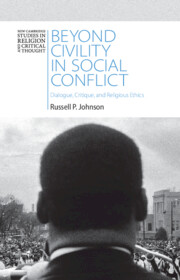Book contents
- Beyond Civility in Social Conflict
- Reviews
- Series page
- Beyond Civility in Social Conflict
- Copyright page
- Dedication
- Contents
- Acknowledgments
- Introduction
- 1 The Three Voices in the Ethics of Communication
- 2 The Rules Are Broken: Dilemmas of Restraint in War and Social Conflict
- 3 Integral Communication
- 4 Illusions and Indirect Communication
- 5 “Dynamically Aggressive”
- 6 Sharing the Good News
- Bibliography
- Index
6 - Sharing the Good News
Integral Communication and Christian Theology
Published online by Cambridge University Press: 08 November 2024
- Beyond Civility in Social Conflict
- Reviews
- Series page
- Beyond Civility in Social Conflict
- Copyright page
- Dedication
- Contents
- Acknowledgments
- Introduction
- 1 The Three Voices in the Ethics of Communication
- 2 The Rules Are Broken: Dilemmas of Restraint in War and Social Conflict
- 3 Integral Communication
- 4 Illusions and Indirect Communication
- 5 “Dynamically Aggressive”
- 6 Sharing the Good News
- Bibliography
- Index
Summary
Normatively speaking, Christianity involves a rejection of “us versus them” ways of thinking and speaking. Christian political advocacy must thereby testify to the reconciliation of all people. It would be ironic, even self-defeating, to advocate for Christian commitments in ways that reify divisions between people or deny opponents’ human dignity. But Christians can still make prophetic and incisive criticisms, take controversial stands, and employ rigorous argumentation. Drawing upon the work of Desmond Tutu and J. Deotis Roberts, I argue that Christian witness always proceeds as “good news.” Good news is not only the content but the form of Christian proclamation. Christian speech disrupts systems of injustice and dehumanizing myths, while simultaneously expressing the truth that every person – even those who are currently oppressors – is a beloved child of God. This conclusion can help Christians engage in political, ethical, and cultural conflicts in ways that are simultaneously more persuasive and more faithful to their convictions.
Keywords
- Type
- Chapter
- Information
- Beyond Civility in Social ConflictDialogue, Critique, and Religious Ethics, pp. 278 - 324Publisher: Cambridge University PressPrint publication year: 2024

